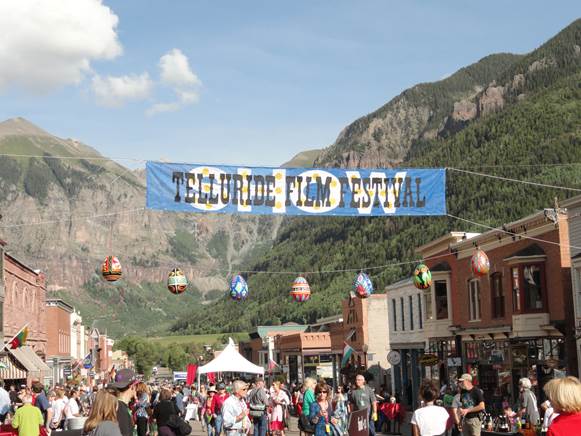Hot Stove readers: I promise I will be back to baseball soon, but I need to get these thoughts down while fresh in my mind. SPOILER ALERT (in case you have not seen the movies).
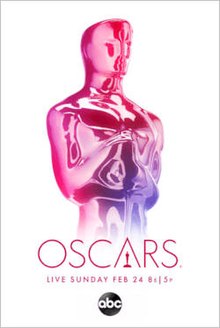
I liked every movie nominated for best picture and did not feel strongly about which one should win. My main reservation was on Roma, not because of its quality, but because it had only a minor run in theatres before streaming on Netflix. If the intent is for most people to see a film on their television instead of at the theatre, maybe it should be awarded an Emmy rather than an Oscar. I’m guessing that’s why Roma lost its luster after being the early favorite. My primary memories of this year’s event were two déjà vu stories. Spike Lee and Glenn Close.
Spike Lee: My first spotting of Spike Lee was in 1986 when he wrote, produced, directed and starred in She’s Gotta Have It. He plays Mars Blackmon who wears Air Jordans (even to bed). This scene (0:43) in the movie prompted two ad guys to connect Nike and Michael Jordan with Spike for an iconic series of humorous and highly effective ads. Take a look (30-second spots): one, two and three. Michael was already pretty well known, but the ads made Spike/Mars and Air Jordans famous around the world.
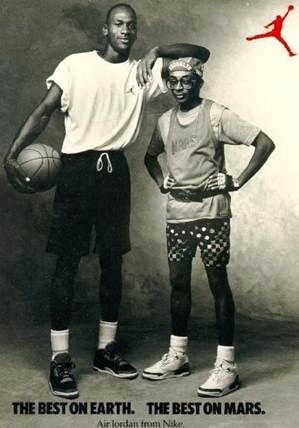
In 1989, Spike wrote, produced, directed and starred in Do The Right Thing, picked as the top movie of the year by Ebert and Siskel. The Academy? Not even nominated for best picture. The Oscar that year went to Driving Miss Daisy, a story of a black man chauffeuring a white woman. Spike no doubt had a sense of déjà vu this year when his BlacKkKlansman lost the Oscar race to Green Book, a story of a white man chauffeuring a black man. Daisy and Green Book are feel good movies with mostly happy endings. Spike’s BlacKkKlansman also embraces black and white cooperation against racism, but the ending is not intended to be so comforting.
When Green Book was announced as the winner, Spike threw his arms up in frustration, later saying it was like an NBA referee making a bad call. He eventually calmed down, saying that Green Book was just not his cup of tea. There were other controversies about Green Book and some critics panned it as a “conventional” movie. But that’s the nature of the awards. Sometimes the conventional wins (Argo and Spotlight). Or the harsh truth (12 Years a Slave). Or the quirky (Birdman and Shape of Water). Or even a silent film (The Artist). Vive la difference. For me, Green Book was an entertaining odd-couple road trip that depicted a unique angle on Jim Crow. My fellow movie fan Jan Hodgson agrees, saying “It was just a warm fuzzy movie for a lot of us who bought a ticket and let the story wash over us in a darkened theater.”
On the surface, the movies might seem similar. They are both based on true stories and celebrate biracial cooperation to combat racism. In Green Book, an African-American pianist and his Italian-American driver tour Jim Crow America in 1962. They bond and become lifelong friends. The audience is no doubt aware that many of the indignities of that road trip will be wiped out by the Civil Rights Act of 1964. In BlacKkKlansman, white and black police officers work together to fight the Klan in Colorado Springs in the early 1970’s. The narrative of that story ends with a welcome win for the good guys. Spike could have tied a bow on the movie at that point for a somewhat happy ending.
But that was not going to happen. Not for Spike Lee who knows that there is no potential Civil Rights law that will magically remove racism from the brain of a white nationalist. And the proof had been starkly presented in real life – the 2017 white nationalist rally in Charlottesville. So after Spike ends his movie narrative with the cops outsmarting the Klan, the film abruptly shifts to footage of Charlottesville. The screen shows that the film is dedicated to Heather Heyer, the young white woman murdered when a terrorist ran his car into the crowd of peaceful protestors. The movie audience did not walk out smiling. It was a punch in the gut. The harsh truth. It was great filmmaking.
Before this year, Spike’s 30 years of critically acclaimed films had not led to any Oscar for his directing, producing or writing. The Academy, maybe trying to make up for that, gave him a lifetime achievement award in 2015 for being “a champion of independent film and an inspiration to young filmmakers.” So when Spike’s name was announced this year for best adapted screenplay, the crowd was exuberant in joining Spike in celebration. The crowd did not join in what he did next. In one of the night’s best moments, Spike rushed to the stage in his Prince-inspired purple suit and leaped into the arms of presenter Samuel L. Jackson who had gleefully announced the win. Jackson was in Spike’s cast in Do The Right Thing. Spike was joined onstage by Ron Stallworth (the real black Klansman) and Lee’s three co-writers, including KU professor Kevin Willmott,
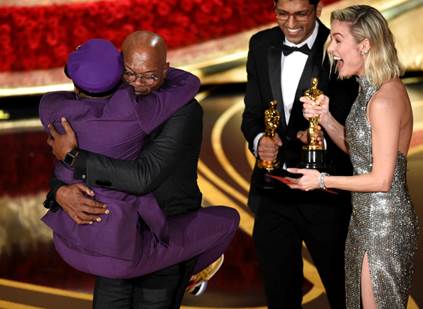
Spike’s homage to Prince was much more than a purple suit. He and Prince were long-time friends and worked together professionally. When Prince died in 2016, he left a treasure trove of unpublished material. Spike thought that a piece from Prince would be perfect to highlight the message and mood as his film ended, to play during the footage of Charlottesville and the credits. An advisor to Prince’s estate suggested an unpublished song that Prince had recorded on a cassette in 1983. It was just Prince at the piano singing an old gospel song, “Mary Don’t You Weep.” Prince’s haunting rendition was indeed perfect for the movie, and the cut would later be included on one of Prince’s posthumous albums. Spike liked it so much that he prepared an extended trailer showing clips from the movie as the music plays. See and listen here (4:28).
Glenn So Close: Glenn Close has been nominated for seven Oscars, but has failed to take one home. I’ll focus on two of them: Fatal Attraction (1987) and The Wife (2018). The déjà vu? In both cases, her serious roles lost out to quirky/funny performances by women who went on to give charming Oscar acceptance speeches. This year it was Olivia Colman for her Oscar-winning portrayal of the slow-witted Queen Anne in The Favourite. In 1987, it was Cher. Yes, Cher.
It was quite a lineup for the best actress nominees for 1987 movies: Glenn Close (Fatal Attraction), Meryl Streep (Ironweed), Holly Hunter (Broadcast News), Sally Kirkland (Anna) and Cher (Moonstruck). Close’s performance as Alex is one I’ll always remember, especially the scene where she rises from the almost dead, rocketing out of the bathtub to renew her knife fight with Michael Douglas (clip is here, 2:42). Cher was not a stranger to Oscar night. She was nominated for her supporting role alongside Meryl Streep in Silkwood (1983). She also had critically acclaimed roles in Robert Altman’s Come Back to the Five and Dime, Jimmy Dean, Jimmy Dean (1982) and Mask (1985).
As much as I liked Glenn Close and Holly Hunter that year, I had a soft spot for Cher as the winner because Moonstruck is one of my all-time favorite movies. Cher’s Oscar win was announced by Paul Newman, and Cher was delightful in her acceptance. And being Cher, as one pundit noted, she was wearing “a black mesh Bob Mackie with strategically placed sequins barely covering key areas of her famously sculpted body.” Another cool thing was Meryl Streep jumping for joy when she heard that her co-star from Silkwood had won. Here is the clip (4:23).
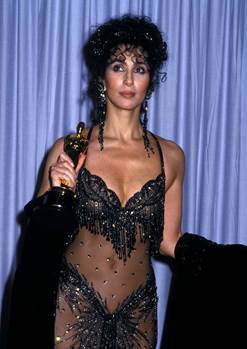
[More 1987 Movie Trivia: While checking on the Glenn Close and Cher info, I was impressed at the lineup of movies for 1987. A partial list: The Last Emperor (won best picture), Fatal Attraction, Moonstruck, Ironweed, Broadcast News, Dirty Dancing, Good Morning Vietnam (RIP Robin Williams), The Untouchables, Cry Freedom, Radio Days, Hope and Glory, Empire of the Sun, Matewan, RoboCop and Full Metal Jacket.]
[More Glenn Close Trivia: In 1994, I went to New York for a big real estate closing. Rita went along for some Broadway shows and to see the winter activity at Rockefeller Center. We paid big bucks (for the time) to get the hottest tickets, Glenn Close playing Norma Desmond in Andrew Lloyd Webber’s musical of Sunset Boulevard. The real estate closing was complicated, four properties in four states, and there was a large contingent of lawyers and paralegals working away as curtain time arrived. I left my NY co-counsel in charge and joined Rita at the theatre. Saw the show, liked it, and then went back to the closing. We worked into the night and closed the next day. Glenn Close went on to won the Tony for best actress in a musical. Just yesterday, it was announced that filming will start in a few months on the movie version of the musical. Glenn Close is reprising her role as Norma Desmond. And we all wonder, will her Tony-winning performance convert into that elusive first Oscar?]
Queen Rocks: Bohemian Rhapsody, the biopic of rock band Queen, won four Oscars out of its five nominations. Rami Malek was terrific as Freddie Mercury and deserved the Oscar. His transition to the role (makeup, chest hair and Mercury’s signature mustache and teeth) was the subject of a fine “CBS Sunday Morning” segment (“How Rami Malek sunk his teeth into the role of a lifetime” – click here, 5:49). Below, Rami on the left, Freddie on the right.
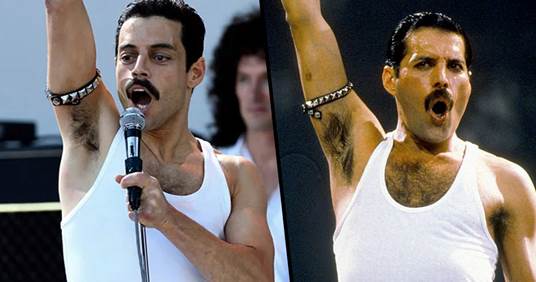
The movie’s re-creation of the 1985 Live Aid concert at Wembley Stadium was superb. Below, first the movie (with the help of computer-generated imagery, aka CGI), and then the actual concert. The best way to appreciate Malek’s portrayal of Mercury is to watch the original Queen at Wembley (24 minutes; 188 million views of this clip). Rami nailed it.
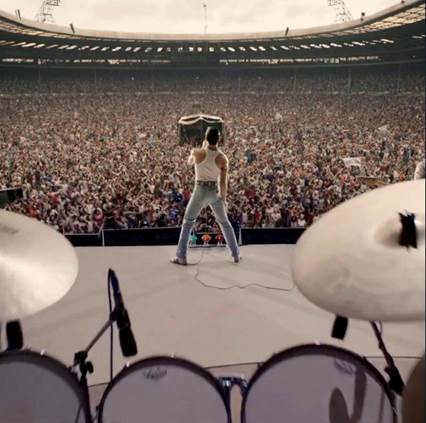
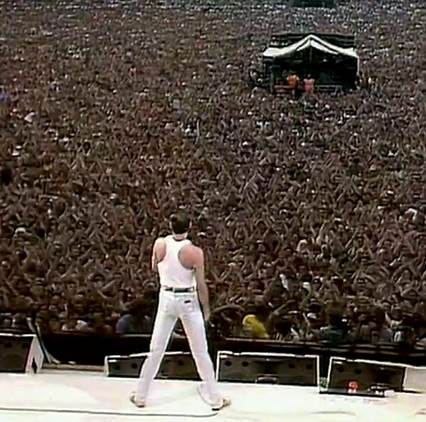
Another Queen Rocks: For those of you who are fans of “The Crown” on Netflix, look for Oscar winner Olivia Colman when the series returns for season three. She is replacing Claire Foy to play an older Queen Elizabeth.
Some Random Thoughts: My friend John Shipp has been in the movie business for decades and sees more movies than anyone else I know. He seems to like almost all of them and I kid him that he’s an easy grader. But I am also guilty. More fan than critic. Especially when in the rarified mountain air at the Telluride Film Festival. One friend told me that he walked out on The Favourite. Apparently not his cup of tea. Well, I agreed with Rita’s description – a fun mash-up of Monty Python and “The Crown.” Another friend gave up on Roma half-way through – “too slow.” Maybe, but that means more time to enjoy the amazing cinematography. But I viewed it in a darkened theater, not on Netflix at home while checking messages on my phone. Different strokes. Bottom line: I found much to like in all of the best picture nominees. Shoot, I liked First Man and The Front Runner when I saw them in Telluride, and they bombed at the box office.
Rita and I usually don’t see the Marvel superhero films, but we saw Black Panther and liked it a lot. It won three Oscars. As did Green Book and Roma.
I really admired the work of Lady Gaga in A Star is Born and applaud her Oscar for “Shallow” as best original song. This was the only Oscar out of eight nominations for the film. She and Bradley Cooper made for a stunning duet on Oscar night (much better than her solo version at the Grammys). If you watch the Queen concert at the clip above, you will see them perform their 1984 hit “Radio Ga Ga.” Yes, that’s what inspired Stefani Joanne Angelina Germanotta to adopt her professional name of Lady Gaga.
Vice was another film with eight nominations, but it only won for best makeup. This was an apt award for masterfully turning Christian Bale into Dick Cheney using about six different looks over the decades covered by the film. Below, both pics are of Christian Bale.
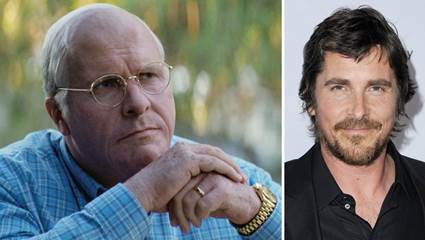
Congratulations to Mahershala Ali who I first remember as the cool lobbyist Remi in “House of Cards.” He has won two supporting actor Oscars, Moonlight two years ago and now Green Book. Best picture winner Moonlight was a film by director Barry Jenkins, and his follow-up If Beale Street Could Talk produced this year’s winning supporting actress, Regina King.
Kudos to Black Panther’s Ruth Carter (costume design) and Hannah Beachler (production design), the first African-American women to win Oscars in these categories.
One more déjà vu sighting. Rita’s prime memory of Fatal Attraction was the disturbing scene (1:58) when Glenn Close boiled the family pet bunny on the stove in Michael Douglas’s home. In The Favourite, the normally sweet Emma Stone turns Machiavellian and surreptitiously uses the heel of her shoe to stand on and torture one of Queen Anne’s pet bunnies . I’m sure no bunny was harmed in the making of these films.
Worldwide box office to date for the best picture nominees, in millions: Black Panther ($1,346M, i.e. over a billion), Bohemian Rhapsody ($861M), A Star is Born ($425M), Green Book ($144M), BlacKkKlansman ($90M), The Favourite ($82M), Vice ($66M) and Roma (not available, that Netflix thing).
Telluride (2011-2018): The streak is over. Rita and I have attended the Telluride Film Festival for the last eight years. For the first seven, we saw the ultimate Academy Award winner for best picture: The Artist, Argo, 12 Years a Slave, Birdman, Spotlight, Moonlight and The Shape of Water. We had two chances this year – Roma and The Favourite were nominated. It was not to be.
But Telluride had some good Oscar moments this year. Roma and The Favourite led in nominations with ten each. Roma won three Oscars: foreign language film, cinematography and director (making it five out of the last six years that a Mexican director has won). The Favourite’s Olivia Colman was best actress. Free Solo won best documentary. The mostly snubbed First Man won best visual effects. Can You Ever Forgive Me had three nominations and Cold War had two.
Telluride 2019: Today is March 1, the first day you can get in line (via the website) to buy passes for the Labor Day Weekend festival. Rita signed us up this morning. Our airline tickets, rental car and condo are also in place. Time to start a new streak.
